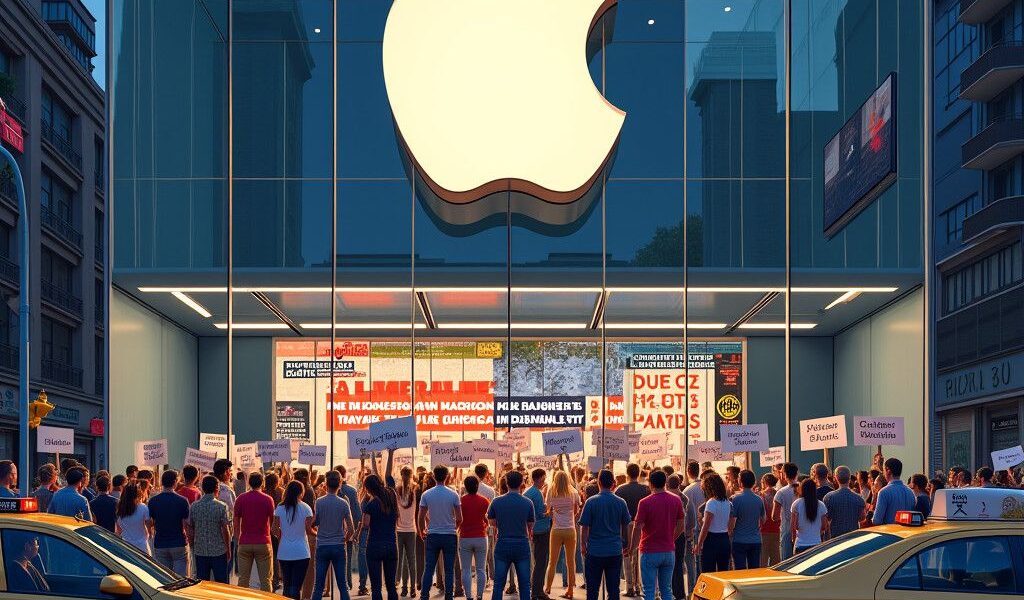Apple Faces Regulatory Action Over Payment System in Brazil
In a significant development that may reshape digital commerce, Brazil’s antitrust regulator, Cade, has mandated Apple to remove restrictions on in-app payments. This ruling follows a complaint from MercadoLibre, a major e-commerce player in Latin America, which accused Apple of unfair practices that inhibit competition and limit consumer choice.
The complaint, lodged in 2022, claimed that Apple was unfairly compelling app developers to use its proprietary payment system. This practice not only restricts developers but also prevents them from offering third-party services or redirecting consumers to alternative purchasing options. Such limitations directly impact the app ecosystem, preventing innovation and diversity in payment methods.
Following a thorough investigation, Cade found merit in MercadoLibre’s arguments. The regulator’s ruling now requires Apple to allow developers the flexibility to integrate external payment systems and provide hyperlinks to external purchasing platforms within their apps. More importantly, developers of Apple’s App Store will have the option to introduce different in-app payment methods, thus promoting a competitive environment.
Failure to comply with this mandate could cost Apple approximately 250,000 Brazilian reals (around £43,000) in daily fines, should they not adhere to the ruling within a 20-day window. As of now, neither Apple nor MercadoLibre has commented extensively on the implications of this ruling.
The Impact on Apple’s Operational Model
Apple’s App Store policies have historically favored its in-house payment solution, allowing the company to carve a substantial share of transaction fees—typically 15% to 30% of total sales—depending on the type of app. Such a model has been challenged globally, reflecting a broader trend where regulators scrutinize tech giants’ control over digital marketplaces.
This regulatory action is not isolated; it mirrors actions taken by other jurisdictions. For instance, similar regulatory challenges have emerged in the European Union and the United States, where lawmakers are increasingly focused on enforcing fair competition in digital marketplaces. The European Commission is actively working on legislation aimed at curbing monopolistic practices among major tech companies, highlighting the global move towards more equitable business practices in the digital sphere.
Economic Implications
The enforcement of this ruling holds potential economic implications for app developers in Brazil. By allowing alternative payment options, developers may experience increased revenue streams and consumer engagement. It empowers them to offer more competitive pricing and enhanced customer service, which could significantly boost local startups and create a more robust app ecosystem.
Additionally, the ability to use varied payment methods can improve market accessibility for consumers who might favor local payment systems over global ones. In Brazil’s diverse financial landscape, enabling multiple forms of payment can lead to better user experiences and increased sales opportunities for developers.
Broader Reactions and Future Prospects
The tech community and market analysts will be observing the developments closely. Should Apple choose to comply with the ruling, it could signal a willingness to adapt its business practices in the face of regulatory pressure. On the other hand, any potential resistance could spark further legal battles and strain Apple’s relationships with developers.
Furthermore, this situation echoes a global call for reform in how digital platforms operate. Many industry experts argue that it is crucial for regulatory frameworks to evolve alongside technology to ensure fair practices and protect consumers’ rights. Innovations in e-commerce and digital payment systems could pave the way for more inclusive economic opportunities, provided that regulations keep pace with advancements.
Conclusion
The recent ruling against Apple underscores the importance of regulatory oversight in the tech industry, particularly regarding how digital platforms manage their ecosystems. As Cade’s mandates come into effect, it may serve as a precedent for other regulators around the world dealing with similar issues of fairness in digital marketplaces.
The outcome of this confrontation could redefine the operational strategies of tech giants while promoting a more competitive and consumer-friendly environment for app developers. It is a pivotal moment not just for Apple and MercadoLibre, but for the future of e-commerce in Brazil and beyond.








